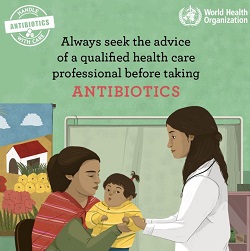 Each November, World Antibiotic Awareness Week (WAAW) aims to increase global awareness of antibiotic resistance (AMR) and to encourage best practices among the general public, health workers and policy makers to avoid the further emergence and spread of antibiotic resistance.
Each November, World Antibiotic Awareness Week (WAAW) aims to increase global awareness of antibiotic resistance (AMR) and to encourage best practices among the general public, health workers and policy makers to avoid the further emergence and spread of antibiotic resistance.
As antibiotic resistance increases, health care providers are being encouraged to have conversations with their patients about antibiotics. The World Health Organisation is warning that these conversations can't wait – our time with antibiotics is running out.
How can GPs begin a conversation about antibiotics with their patients?
Last year, bpacnz published an article for primary care professionals with the following tips:
- When a viral infection is suspected, explain why an antibiotic is not justified. You could provide good advice about symptomatic management, and give an idea of the time course for the particular self-limiting infection.
- Manage patient expectations. You could reassure patients that they made the right decision to seek assessment and just because they do not require an antibiotic, it does not mean that their symptoms are not legitimate.
- Involve patients in decisions about their health care. This involves providing education about the issue of antimicrobial resistance. You could talk about what this means for them, as well as their community as a whole.
- Promote preventative measures for good health. This might include smoking cessation, healthy diet and lifestyle, the principles of good hygiene and infection control measures.
- Consider and explain a delayed prescription. GPs could consider if it's appropriate to issue a prescription that is to be collected if symptoms persist or worsen, and discuss this with patients.
What should you keep in mind if you do choose to prescribe?
GPs are knowledgeable about the risks and benefits of antibiotic use. There may or may not be a risk of not using an antibiotic for that individual, at that time.
If GPs do choose to prescribe, it's important that they choose the right antibiotic, at the right dose, for the right length of time. It's helpful to write patient notes explaining the decision to prescribe an antibiotic.
Prescribing is an interesting subject to cover as part of a peer group discussion. GPs could compare their prescribing with peers, and discuss any differences.
Resources
You might find the following resources useful as you reflect on antibiotic prescribing and antimicrobial resistance.
For patients
For health professionals